|
|
|
Sort Order |
|
|
|
Items / Page
|
|
|
|
|
|
|
| Srl | Item |
| 1 |
ID:
160618
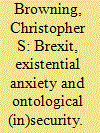

|
|
|
|
|
| Summary/Abstract |
This article explores how the Brexit Referendum on the UK's membership of the European Union has been a source of destabilisation, dread and ontological anxiety. Focusing mainly on British citizens who voted or self-identified as “Remainers”, and on EU foreign nationals resident in the UK, it shows how existential anxieties have had different points of focus for different groups of people. Confronted with such destabilising anxieties, the article shows how people have adopted different mechanisms designed to reassert a sense of order and certitude often viewed as central to preserving ontological security. The ways in which this has been done, however, can themselves raise important questions.
|
|
|
|
|
|
|
|
|
|
|
|
|
|
|
|
| 2 |
ID:
171804
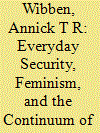

|
|
|
|
|
| Summary/Abstract |
This article returns to the original forum question “What is Global Security Studies?,” looking at it in relation to the theme of inclusion and exclusion to point out that security studies scholars exclude feminist scholarship on (everyday) security at their own peril. Showcasing the increasing body of feminist security studies scholarship, the article then highlights not only what scholarship might be included in a truly global security studies, but also the important insights (e.g., about the continuum of violence that spans peace- and wartime) that are missed without it. The article ends with a reflection on the need to also include a wider range of approaches as eminently valuable to global security studies.
|
|
|
|
|
|
|
|
|
|
|
|
|
|
|
|
| 3 |
ID:
185184
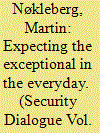

|
|
|
|
|
| Summary/Abstract |
There has been considerable scholarly interest regarding the notion of exceptionality, i.e. how and under what conditions extraordinary powers and measures are justified in the name of security. Exceptional threats are now omnipresent in the security discourse of the aviation and maritime industries, and this influences the everyday working environment. Taking Norwegian airport and port security as its point of departure, this article analyzes how security and policing agencies perceive, experience, and respond to the exceptional as part of their everyday practice. Drawing on extensive interview material with security agencies, it reveals how agencies construct strategies to cope with the consequences of exceptionality that arise from heightened (in)security and vulnerability. This article demonstrates that instrumental logic in risk management is one crucial strategy, but evidence also reveals the importance of the human dimension in security practices, as the emotional aspect of security consciousness is a part of the everyday life of security agencies. Closely associated with this is the emergence of mechanisms of active resistance that provide excitement and alleviate boredom.
|
|
|
|
|
|
|
|
|
|
|
|
|
|
|
|
| 4 |
ID:
151176


|
|
|
|
|
| Summary/Abstract |
The performance of International Relations (IR) scholarship – as in all scholarship – acts to close and police the boundaries of the discipline in ways that reflect power–knowledge relations. This has led to the development of two strands of work in ontological security studies in IR, which divide on questions of ontological choice and the nature of the deployment of the concept of dread. Neither strand is intellectually superior to the other and both are internally heterogeneous. That there are two strands, however, is the product of the performance of IR scholarship, and the two strands themselves perform distinct roles. One allows ontological security studies to engage with the ‘mainstream’ in IR; the other allows ‘international’ elements of ontological security to engage with the social sciences more generally. Ironically, both can be read as symptoms of the discipline’s issues with its own ontological (in)security. We reflect on these intellectual dynamics and their implications and prompt a new departure by connecting ontological security studies in IR with the emerging interdisciplinary fields of the ‘vernacular’ and ‘everyday’ via the mutual interest in biographical narratives of the self and the work that they do politically.
|
|
|
|
|
|
|
|
|
|
|
|
|
|
|
|
| 5 |
ID:
093882
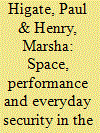

|
|
|
|
|
| Publication |
2010.
|
| Summary/Abstract |
Studies of peacekeeping have helped to reveal the complexities, dilemmas and challenges of operations since their inception, and almost certainly into the future. Yet, despite the empirical and theoretical breadth of this canon, the field continues to be dominated by political science, development studies, international law and military studies, whose scholars tend to draw on 'problem-solving', macro-level and positivist perspectives in their writings. The impact of post-structural and post-positivist epistemologies developed in sociology, human geography and cultural studies remain marginal in the field. Given this, the present article seeks to complement and develop the study of peacekeeping through its framing of blue-helmet activity as embodied, spatial-security practice that is performed 'out front' for the 'beneficiary' audience. In so doing we draw on critical geopolitics, military/human geography and sociological theorizing with a focus on space and performance. Our main aim is to show how the concepts of space and performance can be used to illuminate perceptions of everyday security by recourse to a modest, illustrative empirical component based on fieldwork in Haiti, Kosovo and Liberia.
|
|
|
|
|
|
|
|
|
|
|
|
|
|
|
|
| 6 |
ID:
159216


|
|
|
|
|
| Summary/Abstract |
Discussions generated in Russian and Western academic, policy-making and media circles by recent terrorist attacks in the Middle Volga and Urals (İdel-Ural) derive primarily from hegemonic state discourses and as such miss the wealth of discussion generated in local-language sources about the causes and implications of these attacks. The goal of this study is to provide an examination of the various perspectives concerning terrorism in the region, focusing on the level of Tatar (and secondarily Russian) society. Employing insights from a recent body of literature on ‘everyday’ and ‘vernacular’ (in)securities as well as on conspiracy theories, I examine Tatar-language Internet forums posted on the Radio Free Europe website related to the terror events of July 2012. I detect no incitement to violence among the Tatar-speaking participants. However, my results suggest that Tatar publics use diverse interpretive repertoires to make sense of a securitizing reality. The study suggests that Tatar-speaking publics depart in important ways from the dominant narrative of the ‘police’ order as well as from the Weltanschauung of their Russian-speaking compatriots.
|
|
|
|
|
|
|
|
|
|
|
|
|
|
|
|
| 7 |
ID:
164454
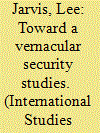

|
|
|
|
|
| Summary/Abstract |
This article seeks to situate, evaluate, and advance the recent “turn” toward the “vernacular” within security studies. It argues that vernacular security studies has significant advantages over alternative “bottom up” approaches. First, its conceptual emptiness allows for genuinely inductive research into public experiences, understandings, anxieties, and fears. Second, it offers engagement with a potentially far richer tapestry of everyday (in)securities by refusing to prioritize particular populations by virtue of their identity or sociopolitical position. And, third, such an approach avoids the universalism inherent within related, yet more explicitly cosmopolitan, approaches to security. The article begins by situating vernacular security studies within relevant intellectual and (geo-)political dynamics from the late twentieth century. A second section distinguishes this approach from six alternative traditions with a similar emphasis on individual human referents: human security, critical security studies, postcolonialism, feminism, ontological security studies, and everyday security studies. The article then elaborates on the significance and added value of vernacular approaches to security, before outlining core conceptual, methodological, and ethical questions for future research.
|
|
|
|
|
|
|
|
|
|
|
|
|
|
|
|
|
|
|
|
|